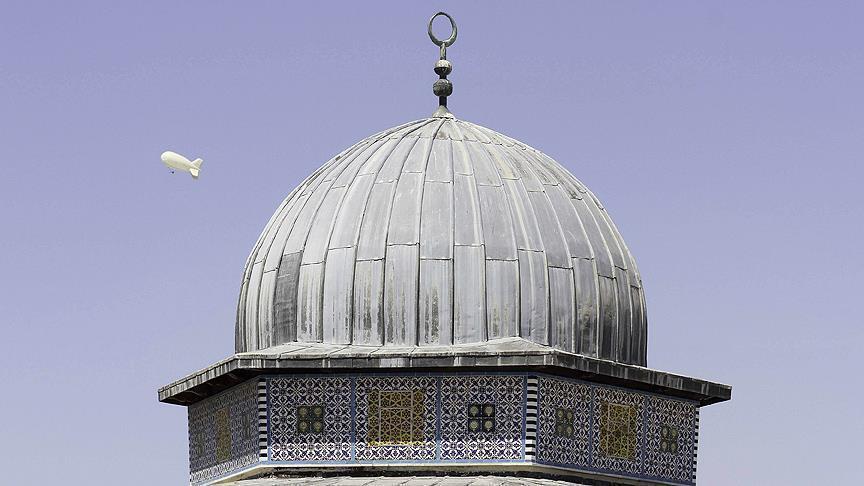47 years on, Palestinians recall Aqsa mosque fire
The arson attack was one of several assaults on the flashpoint site since Israel’s occupation of East Jerusalem in 1967

Palestinian Territory
By Anees Bargouthi
JERUSALEM
Forty-seven years ago, extremist Australian tourist Denis Michael Rohan set fire to the flashpoint al-Aqsa Mosque in Israel-occupied East Jerusalem.
“I still remember the fire as if it happened yesterday,” Sheikh Ekrema Sabri, the head of the Supreme Islamic Council and former preacher of Al-Aqsa mosque, told Anadolu Agency on Sunday.
“The moment the people of Jerusalem heard about the fire, they rushed in, bringing water inside cans to put out the blaze,” he said.
The fire has destroyed nearly third of the al-Qiblah mosque, including the 1,000-year old priceless wood and ivory pulpit of conqueror Saladin.
Sabri accused Israeli authorities of cutting off water from the area and preventing fire engines from reaching the site to extinguish the fire.
“Around 1,550 square meters of the 4,500 square meters that comprise the Al-Aqsa mosque compound were completely destroyed by the fire,” he said.
The blaze also destroyed the mihrab (prayer niche) of Muslim caliph Omar bin al-Khattab, the decorated interior and the gilded wooden dome.
“It was a grisly crime and a terrible tragedy,” Sabri recalled. “It took us more than 30 years to repair the damage caused by the fire,” he said.
In response to the arson attack, Islamic countries founded the umbrella Organization of the Islamic Conference, now the Organization of Islamic Cooperation (OIC), during their summit in Morocco.
On September 15, 1969, the United Nations Security Council adopted resolution 271, which grieved at the extensive damage caused by the fire and condemned Israel for failing to respect UN resolutions.
Rohan was arrested two days after the arson attack. Israeli authorities said that he was suffering from severe mental illness and later expelled him to Australia.
For Muslims, Al-Aqsa represents the world's third holiest site. Jews, for their part, refer to the area as the "Temple Mount," claiming it was the site of two Jewish temples in ancient times.
Israeli excavations
Mahmoud Shtaiyeh, 69, a witness to the fire, said Rohan had planned the arson attack in advance.
“The fire was set to three different areas in the mosque,” Shtaiyeh told Anadolu Agency.
He recalled that thousands had run into the mosque in a despite attempt to extinguish the fire.
“[We] began to put the fire out with cans, buckets, clothes and even with our bare hands,” he said. “We were not afraid of death; all it was a matter to save the Al-Aqsa mosque.”
The arson attack was one of several assaults on the flashpoint site since Israel’s occupation of East Jerusalem in 1967.
In April 1982, an Israeli soldier indiscriminately opened fire on worshipers inside the mosque, killing two and wounding six others.
In October of 1990, Israeli police killed 21 Palestinians and injured scores during clashes that erupted when Jewish extremists tried to place the foundation stone of a Jewish temple inside the mosque.
Israeli authorities, meanwhile, have carried out "archaeological" work in the vicinity of the mosque without disclosing the exact nature or details of these excavations.
Palestinian anger at the excavations reached a fever pitch in September 1996, when the Israeli government opened a tunnel under Al-Aqsa mosque’s western wall.
The Israeli move invited Palestinian fury, sparking days of demonstrations across Israeli-occupied territories, during which 63 Palestinians were killed and hundreds injured.
In September 2000, a visit to Al-Aqsa by controversial Israeli politician Ariel Sharon sparked what later became known as the "Second Intifada," a popular uprising against the Israeli occupation in which thousands of Palestinians were killed.
“Since 1967, the Israeli occupation authorities worked intensively to build settlements around Jerusalem in order to surround the city and isolate it from its Arab surrounding,” Hanna Issa, a Palestinian expert on settlement affairs, told Anadolu Agency.
“This policy not only aims to isolate Jerusalem, but also to prepare the ground for the demolition of Al-Aqsa mosque, in order to build the alleged Solomon’s temple in its place,” he said.
Issa went on to assert that Israeli authorities have opened more than 25 tunnels underneath the Al-Aqsa mosque compound since 1996, warning that the Israeli excavations have already weakened the mosque’s foundations.
“The mosque won’t stand a moderate earthquake and this is what Israel wants,” he said.
Anadolu Agency website contains only a portion of the news stories offered to subscribers in the AA News Broadcasting System (HAS), and in summarized form. Please contact us for subscription options.







